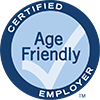
Stroke & Mood Disorder
Caregiving Services You Can Trust
It is common for people to experience feelings of depression, frustration and the like after having a stroke. Researchers are studying if a stroke in a certain part of the brain will lead to people having specific mood disorders.
There are many treatment options available, including medication and professional mental health counseling.
Experts recommend that after someone has had a stroke they get support from a variety of sources to help with everything from physical challenges to mood disorders. A full team to successfully rehabilitate someone who has had a stroke might include physicians, physical therapists, occupational therapists, speech/language pathologists, vocational therapists, rehabilitation nurses, social workers, a member of the clergy, a case manager, an in-home caregiver, and more.
In addition, it can be beneficial to join a support group of other stroke survivors. A support group might be able to meet in person or online. Getting out and engaging with others can have a benefit to one’s well-being also.
Consider too that nutrition can impact moods and the better the diet the better the mood. Regular physical activity can also be a mood booster as well as part of one’s rehabilitation.
Contact Homewatch CareGivers for more information about our stroke mood disorder tips.

Homewatch CareGivers is Here to Help.


















